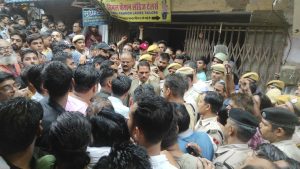Tensions were high Wednesday in the western Indian city of Udaipur, a day after police arrested two Muslim men accused of slitting a Hindu tailor’s throat and posting a video of it on social media. The brutal attack represents a dramatic escalation of communal violence in a country riven by deep religious polarization.
The killing comes after months of rising tensions between Hindus and Muslims, and has raised fears it will spark increased violence.
Authorities suspended internet services in the city and surrounding Rajasthan state in an attempt to prevent the gruesome video from being shared, while rushing additional police to Udaipur and banning large gatherings in an attempt to prevent religious unrest from escalating. In New Delhi, a few dozen people associated with right-wing groups demonstrated against the killing and demanded the culprits be hanged.
In recent months, there have been a spate of attacks by Hindu nationalists on minority groups — especially Muslims — who have been targeted for everything from their food and clothing style to interfaith marriages. Muslim homes have also been demolished using bulldozers in some Indian states, in what critics call a growing pattern of “bulldozer justice” against the minority group.
The animosity worsened in May when two spokespeople from Prime Minister Narendra Modi’s party made speculative remarks that were seen as insulting Islam’s Prophet Muhammad and his wife Aisha. Both were later suspended by Modi’s party.
The tailor who was slain on Tuesday, identified as 48-year-old Kanhaiya Lal, had reportedly shared a social media post supporting one of the spokespeople who were suspended for the Prophet Muhammad remarks, according to local media.
The two men who were arrested a few hours after the attack, identified as local Udaipur residents Gos Mohammad and Riyaz Akhtari, posted a second video of themselves in the aftermath of the killing, accusing Lal of blasphemy and threatening to kill Modi in the same way, smiling as they sat on a couch, brandishing long blood-covered knives.
In the video of the attack itself, one of the assailants can be seen being measured by the tailor, while the other one films.
The man being measured then attacks Lal with a knife, stabbing at him as the tailor desperately tries to fend him off with his hands. The man filming then apparently drops his phone and joins the attack, and Lal can be heard screaming for help as he is killed.
Police later said the men slit Lal’s throat, and television reports aired footage of the tailor’s bloody body on the ground.
Despite pleas from the police, both videos were still circulating on social media platforms like Twitter and Facebook a day later.
Experts worry that the latest incident could worsen India’s religious fault lines that critics say have deepened since Hindu-nationalist Modi came to power in 2014.
The divisions were exacerbated by the remarks by his party’s spokespeople about the Prophet Muhammad in May, which also led to a severe diplomatic backlash for Hindu-majority India from many Muslim-dominated countries.
“This gruesome incident could lead to escalated religious tensions across India, especially with the ruling party espousing a very strident Hindu majoritarian cause,” said Sushant Singh, a senior fellow at the Centre for Policy Research, a public policy think tank.
“It is unlikely that this government or leadership would go out of its way to tell supporters to not get provoked, to urge for calm and peace,” he said.
Attacks on people accused of alleged blasphemy are common in neighboring Muslim-majority countries like Bangladesh and Pakistan. But in India, where religious tensions often boil over into sporadic riots and deadly protests, incidents of brutal killings of this nature are rare.
In May, a Hindu man in the southern city of Hyderabad was stabbed to death in public by his Muslim wife’s relatives. Last year, a Muslim man was beheaded by members of a vigilante group on orders of his girlfriend’s Hindu family because they didn’t approve of their interfaith marriage. In Rajasthan state in 2017, a Hindu man brutally killed a Muslim laborer and shared a video of the victim being hacked to death and then set on fire.
It was not clear whether the two alleged killers of the tailor had links to any terrorist organization, but India’s Home Ministry has dispatched a team from its anti-terror agency to Rajasthan to investigate. So far, the state police have not charged the two arrested men with terrorism.
Jamaat-e-Islami Hind, a key Muslim body, condemned the killing in a statement and called it “barbaric.” “There is no room for justification of violence in Islam,” it said.
Rajasthan Chief Minister Ashok Gehlot promised a speedy investigation into Lal’s killing. “I again appeal to all to maintain peace,” Gehlot said in a tweet.

































